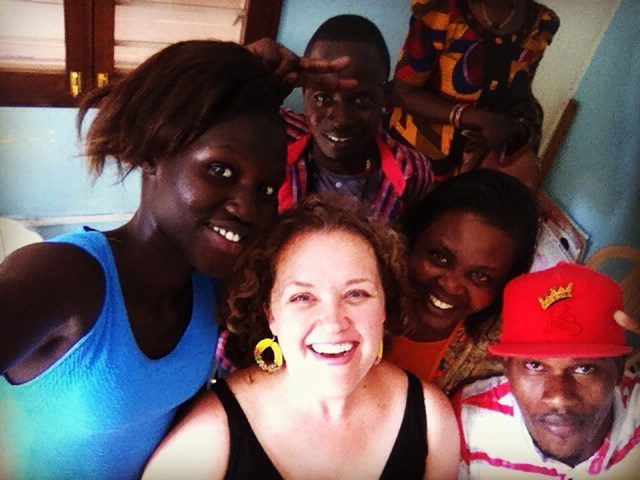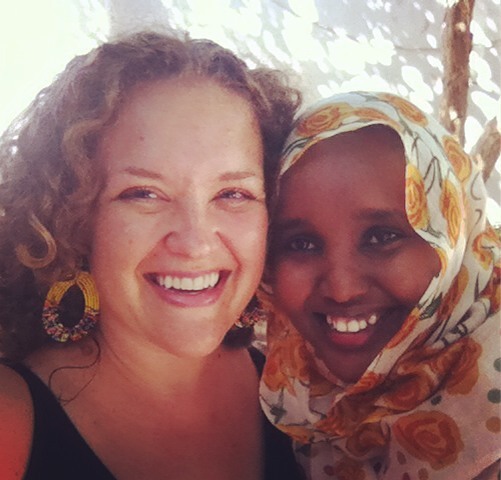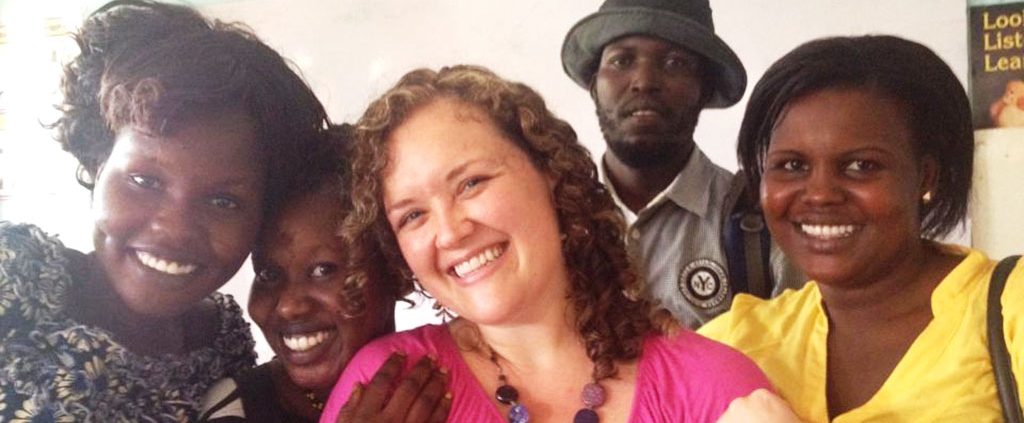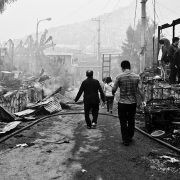3 Reasons I Welcome Refugees (And 3 Ways You Can, Too)
Did you know nearly one in 100 people worldwide are displaced from their homes?
Refugees have become so much more than an Associated Press photo in my mind and my heart. For three years, I taught students at a refugee center in Uganda. I’ve played sports, shared meals, and exchanged emails and Facebook posts with them, and helped them develop products for their businesses. They’ve also shared their cooking with me, and hung out with my kids. Our kids have even played tag together.
The refugees are among some of the most resilient individuals I’ve ever met. They are courageous strugglers and hard workers.
They have so much to offer.
Why I Welcome Refugees
While my husband’s and my work has taken me away from the center, I still work diligently to welcome refugees into my own life here in America. Here’s why:
1. Refugees give back
I’ll be honest with you: Some of my students had never sat in a classroom prior to their seat at the refugee center. Their nations had been at unrest for too long. If you’re trying to stay alive, you usually aren’t sitting in school.
In Kampala, Uganda, I instructed in stuffy classrooms full of eager adult refugees from eight African nations. Many of these students, as adults, were learning to read for the first time. They were adjusting to a new culture and so many new ways of doing things. At least one of our Western-style bathrooms at the center had a printed poster: Please don’t stand on the seats. They were all learning English, business skills like computing or sewing or baking, and health skills.
And here’s what’s happened: In Kampala, 21 percent of refugees owned a business that employed other people—and 40 percent of those employees were Ugandan nationals. Experts at Oxford University’s Refugee Studies Centre looked at the situation in Uganda and called it “exceptional.” Though welcoming refugees into a developing nation is different from welcoming them into more developed nations, experts concluded that when refugees are given the right to work and freedom of movement, “the results are extraordinary, both for the refugees and the host community.”
Not only that, but God has used refugee crises the world over to bring people into a relationship with Himself. Not only have I heard stories of Middle Eastern refugees converting to Christianity, but I have read of a revival in Danish churches caused by Iranian refugees seeking Jesus. These are only a small representation of the beauty God is working worldwide as God blesses not only the refugees—but blesses through the refugees.
2. God loves refugees
I believe the need that is before us, and God’s words about refugees, are too great for me to turn a blind eye. According to the UN in 2014, every 4.1 seconds, someone becomes a refugee or is internally displaced. 41 per cent of refugees are under 18.
If these stats scare you a bit, know that the chances of being killed by a refugee-turned-terrorist are actually one in 3.64 billion. (For perspective, your chances of being killed by a cow are greater; they kill 20 people per year.)
From personal experience, I understand exquisitely that taking in refugees is not always comfortable or safe. This was crystallized for me when refugees from Rwanda stayed with my family. As her toddler ran around without a diaper, as the smell of the liver she was frying filled my kitchen, as we strategized on how to help her find a job, I mulled over Isaiah 58.
Is not this the kind of fasting I have chosen: to loose the chains of injustice. . . ? Is it not to share your food with the hungry and to provide the poor wanderer with shelter—when you see the naked, to clothe them, and not to turn away from your own flesh and blood? (Isaiah 58:6-7)
God must have known exactly what He was asking of us in these questions.
The promises immediately following these two verses were also staggering: “Then your light will break forth like the dawn, and your healing will quickly appear; then your righteousness will go before you, and the glory of the Lord will be your rear guard. Then you will call, and the Lord will answer; you will cry for help, and he will say: Here am I.” (Isaiah 58:8-9)
I think these promises mean that not only would God reward us, but He would also change us as we take these burdens as our own. His heart would mold ours as we, like he did for us, welcome those who cannot immediately repay us.

3. Refugees change me
It is true: I am indelibly different. It continues to push my family from a we-give-all-our-old-clothes-to-Goodwill kind of generous, more toward His I-give-until-it-hurts-and-then-I-keep-going kind of generous. The needs are too great, the differences in our circumstances too vast, the faces in my mind too vivid and personal. I can no longer elbow “the poor” to the edges of my mind.
David’s words, when trying to stay a plague on Israel, still haunt my mind: “I will not sacrifice to the Lord my God burnt offerings that cost me nothing” (2 Samuel 24:24). If God is passionate about the poor and their injustice—this God who came to preach good news to the poor, to set prisoners free—can I be content to throw them my old clothes?
So, since I have returned to America, I have determined that the poor should receive a generous slice of my time, my passion, my energy, my budget, even my career. In a land that is prosperous to the point of obesity (and I don’t exclude myself from this)—though I cannot hear the physical voices of refugees—I never want to forget them.
I will advocate for them, tell their stories, and sign petitions. My family will give generously. I will help the poor among me, wherever they are from. I will thank the Middle Eastern woman beside me in Arabic, offering her a kind smile. I will invite the Hispanic immigrant’s son over to play with mine, and I will tell them how thankful I am that they are a part of my community.
Refugees and I have far more in common than I thought. A friend recently reposted R. C. Sproul Jr.’s wise words: “If the lesson you get from Jesus hanging with sinners is you should hang more with sinners, you’re confused on who you are in the story.” And I continue to return to David Platt’s words on adoption—that we adopt not because we are the rescuers, but because we are the rescued.
Jesus took me when I was an alien—not just an alien, an enemy—and made me His daughter. He gave me liberty, skills, purpose, a future, a home. He gave me love. And really that—He—is why I welcome refugees.

How You Can Welcome Refugees
“Um. . . I’m not even sure I know any refugees. So what can I do?”
I’ll echo some of the suggestions from “A Sane Approach to the Refugee Crisis,” an article published in Christianity Today.
1. Intentionally, strategically love on refugees
One friend of mine, out jogging in America, felt a niggling to reach out to a pair of refugee women she ran by every day, whose children also went to her daughter’s school. When she did stop and talk with them, she found that one’s eyes were filled with tears; in light of the climate toward refugees, they were too afraid to walk alone. As the Church, we have a tremendous opportunity to care for these bereft families.
Refugees sometimes need help with the most basic services in our communities, like medical appointments or navigating paperwork; others would love help with English, reading, or job skills. Before we left for Uganda, my husband and 5-year-old distributed Christmas gifts to refugees.
What refugee communities live in your area? (Perhaps your church is already connected!) You’re a Google search away from finding organizations already helping those near you. And if you’re freaked out about the language barrier, remember that kindness can be expressed through simple service; through washing someone’s feet in any form.
2. Donate
A practical way to help is by donating to vetted organizations who provide for refugees’ tangible needs—particularly career training. I’m partial to Refuge and Hope, because I see them helping refugees develop their God-given abilities and talents, empowering them to become vital, well-rounded, thriving members of a community. World Relief is one of the few organizations that have permission to help with resettling Syrian refugees in the U.S. There are many other organizations that are involved in refugee work. Spend some time reading up about these organizations and the work that they do, and support the ones that engage the causes that grab your heart and mind.
3. Pray for them
Perhaps this seems like a no-brainer—but even as I sit and type this, I realize how little I’ve prayed about the current crisis. Prayer is one of the most critical and powerful forms of loving the poor; of taking them and their needs into our hearts, lending our imaginations to their realities, and pleading for God’s intervention on their behalf. Pray that:
- the Church will richly, sacrificially extend God’s love and protection
- refugees will be led to Christ
- refugees will be protected, and for the protection and wisdom of host countries
- God will show you personally how to respond
I count over 70 references made by the Bible to foreigners and refugees. God identifies Himself as the God of the orphan, the widow, and the alien. I want us, too, as His followers, to be famous for this. Wanna help?
This article was originally published on the writer’s blog here. This version has been edited by YMI.











Trackbacks & Pingbacks
[…] Source: Off The Page – 3 Reasons I Welcome Refugees (And 3 Ways You Can, Too) […]
[…] Source: Off The Page – 3 Reasons I Welcome Refugees (And Three Ways You Can, Too) […]
Leave a Reply
Want to join the discussion?Feel free to contribute!